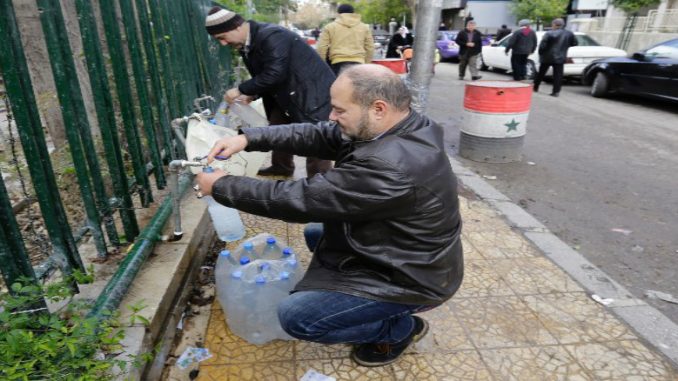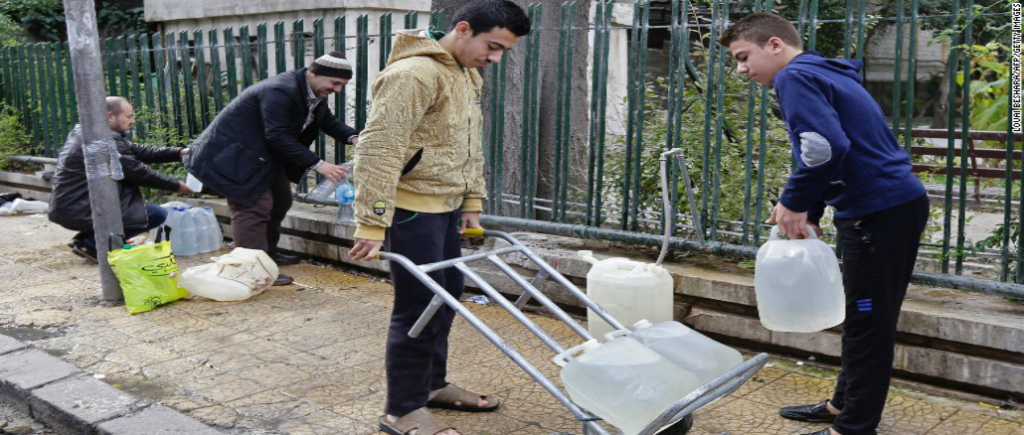
More than 5.5 million people have only minimal access to water supplies in the Damascus area due to the military operations of Assad regime around their water sources, while the UN has said that targeting water sources constitutes a war crime.
Assad regime forces backed by Hezbollah and Shia militias have launched the attack on Wadi Barada valley since 22 December, with daily bombing and air raids on the area. The water in Damascus has been cut ever since.
Rebels say the army is seeking to recapture the area, where a major spring provides most of Damascus’s water supplies and which lies on a major supply route from Lebanon to the Syrian capital used by Hezbollah.
The daily clashes are associated with heavy shelling operations by the regime forces using tanks, artillery and mortar shells, and the launching missiles believed to be ground-to-ground, along with airstrikes by warplanes and the barrel bombs of the helicopters, which left tens casualties and injuries
The government assault has coincided with a severe water shortage in Damascus since December 22. Images from the valley’s Media Center indicate its Ain al-Fijeh spring and water processing facility have been destroyed in air strikes. Rebels say the government bombed the water pumping station at the start of the campaign
The government says rebels spoiled the water source with diesel fuel, forcing it to cut supplies to the capital.
Wadi Barada has been surrounded by government forces since mid-2015, but the siege was tightened in late December as the army piled on pressure seeking to secure a “reconciliation” deal.
It has won several of these deals in opposition areas around the capital, offering safe passage to surrendering rebels in return for retaking territory.
The opposition criticizes them as a “starve or surrender” tactic.
The opposition forces said they will not abandon their land, and called on the global powers in UN to save the water reserve and source.
#وادي_بردى #WadiBarada
صور لنبع #عين_الفيجة الذي يعتبر مصدر مياه الشرب الرئيسي لسكان العاصمة #دمشق قبل و بعد إستهدافه من قبل قوات النظام pic.twitter.com/9CRDAcHKH6— وادي بردى (@w_barada) December 26, 2016
#وادي_بردى
Video from Assads media shows how the Assad regime forces targeted civilian homes #WadiBaradahttps://t.co/zYuC8Vmxfz— وادي بردى (@w_barada) January 3, 2017
The UN warns
The two main water sources for the capital – Wadi Barada and Ain-el-Fijah – are out of action because of “deliberate targeting”, the U.N. said on Dec. 29, although it has declined to say which of the warring sides was responsible.
Jan Egeland, the humanitarian adviser to the U.N. Syria envoy, said on Thursday that denying people water or deliberately sabotaging water supplies was a war crime.
He said damage to the water facilities as very bad and major repairs would be needed. But a U.N. request to send repair teams faces “a whole web of obstacles” including approvals from the Ministry of Foreign Affairs, the local governor’s office and security committee, and the two warring sides, Egeland said.
He did not say who was blocking access.
World Health Organization spokesman Tarik Jasarevic said that the repairs would take at least four days, probably longer.
Civil organizations in the area said they were ready to find a solution to the water crisis that doesn’t include the civilians’ displacement.
they also called the UN to check the rubble for pieces of evidence of Assad regime responsibility of the attacks.
” We reaffirm our readiness to facilitate the access of technical teams from the red cross and united nations to assess the situation around Ein al-Fijah and the facilities operating there, in addition to documenting the remanents of rockets and weapons used to bomb the spring,” they said in a statement.
“We are willing and ready to accompany the assessing and maintaining teams to Ein al-Fijah spring to facilitate resupplying fresh water.”
Water crisis and expected diseases
A state of discontent and resentment prevail the capital, as a result of the continued cutting of water, where the prices of mineral water and the water sold in the capital insanely rose, the citizens depend on the water of wells that were drilled in streets and parks, in addition to wells in pools at the capital, while the regime authorities organize pumping water from other sources to neighborhoods and suburbs in the capital Damascus, by organizing tables that determine the time of water pumping to each area, as well as distributing water through water tankers, while some people in the capital rely on the mineral water that traders exploit the people’s urgent need of it, and raise the prices doubles.
Children are at risk of waterborne diseases in Damascus, the the UN’s Office for the Coordination of Humanitarian Affairs (OCHA) said on Friday.
“[People] are having to purchase water from private vendors, where prices and water quality are unregulated,” OCHA said in a statement. “The UN is concerned about the lack of water which could lead to waterborne diseases, particularly among children, as well as the financial strain this is having on families.”
“There is a major concern about the risk of waterborne diseases among children,” UNICEF spokesman Christophe Boulierac said.
Boulierac said children in Damascus were bearing the brunt of collecting water for their families.
“A UNICEF team that visited Damascus yesterday said that most children they met walk at least half an hour to the nearest mosque or public water point to collect water. It takes children up to two hours waiting in line to fetch water amid freezing temperatures.”
A medic in Damascus city center said many people are worried that the drinking water being distributed by the regime might be contaminated. He added that residents are more concerned with finding potable water than going to the doctor.
One 60-year-old woman said she had not had running water in her home for 10 days. Her two sons have spent hours each day lining up to fill jugs from the well at their mosque. They use that to drink and to wash dishes, collecting the runoff to flush the toilet.
“My family’s dream is to get a warm shower,” she said, speaking on condition of anonymity for fear of repercussions for communicating with a foreign news outlet without government permission. “It has become our ultimate hope in Damascus to have enough water to take showers and wash clothes in the automatic washing machine.”
She expressed anger that Syria’s state-run news media had said little about the water crisis, instead focusing on the military’s battles with rebels.
“We are fed up with the news of military operations,” she said. “We want news about water and water supply schedules.”

The Syrian crisis began as a peaceful demonstration against the injustice in Syria. Assad regime used to fire power and violence against the civilians and led to armed resistance. 450.000 Syrians lost their lives in the past five years according to UN estimates, and more than 12 million have lost their homes.
